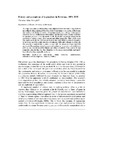| dc.contributor.author | Makgala, C.J. | |
| dc.date.accessioned | 2010-07-13T13:38:36Z | |
| dc.date.available | 2010-07-13T13:38:36Z | |
| dc.date.issued | 2009 | |
| dc.identifier.citation | Makgala, C.J. (2009) History and perceptions of regionalism in Botswana, 1891-2005, Journal of Contemporary African Studies, Vol. 27, No. 2, pp. 225-242 | en_US |
| dc.identifier.issn | 0258-9001 | |
| dc.identifier.uri | http://hdl.handle.net/10311/553 | |
| dc.description.abstract | Although economic, political, ethnic and religious factors have led to regionalisms and other divides, causing civil strife and civil wars in many countries, in Botswana the north south divide existed for a long time merely as a political undercurrent.
However, the turn of the twenty-first century saw the explosion of issues motivated by perceptions that it was the north south divide that caused imbalance in the
provision of infrastructural development and ethnic inequality. This article traces
the north south divide in Botswana back to the early British colonial enterprise, when it was used for administrative convenience. Although in the post-colony the
first president handled the situation pro-actively, his successors abandoned this
approach. Regionalism ensued as personal ambitions for power and wealth took
political and sometimes tribal dimensions. Ethnic identities were used to bolster
campaigns despite the fact that identities in Botswana are multiple and multilayered rather than mutually exclusive. | en_US |
| dc.language.iso | en | en_US |
| dc.publisher | Routledge (Taylor and Francis group), http://www.routledge.com | en_US |
| dc.subject | North-south regionalism | en_US |
| dc.subject | Infrastructural development | en_US |
| dc.subject | ‘Minority’ tribes | en_US |
| dc.subject | Ethnic identities | en_US |
| dc.subject | Undercurrents | en_US |
| dc.title | History and perceptions of regionalism in Botswana, 1891-2005 | en_US |
| dc.type | Published Article | en_US |

